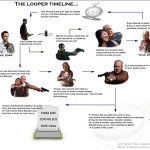“Time travel hasn’t been invented yet, but in thirty years, it will have been. It’s gonna be used by these three criminal syndicates.”
…and since we’re talking time travel, I thought it right to categorise this movie as Sci-fi rather than Action and Adventure or Thriller, either of which it could plausibly be considered.
Looper is one of those movies involving time travel in which things work ok so long as everyone follows the rules, but all hell breaks loose when some dumb ass screws it up. Meanwhile, the hero always starts following the rules but there comes a time when chaos theory applies, the rules get broken and things come badly unstuck.
You know the sort I’m talking about, because there are lots of these sorts of movies around, from Back to the Future to Bill & Ted via the Butterfly Effect and up to the Time Traveller’s Wife. Mess with the rules of time and everything changes, know what I mean?
In this case modern day hired guns kill those sent back from 30 years into the future and dispose of them for a fortune in silver, but there’s a catch. Once their ties are cut they are allowed to live 30 years before it is they who are sent back to be killed by their younger selves, if they can bear to go through with it. And if they can’t, that’s when the trouble starts.
Thus, Joseph Gordon-Levitt faces his own older self in the form of Bruce Willis, and rather than shooting him ends up getting battered unconscious, which makes him a target for some slightly thick enforcers known as ‘Gat Men’. Would that my future self looked like old Bruce, but let that pass. Facing up to yourself 30 years on must be a tad daunting but they’re not exactly bosom buddies, Joe junior and Joe senior. Such is life when you hate yourself, but plus ca change, plus c’est la meme chose.
With me so far? Good, because there’s more. There’s a future uber-baddy known only as ‘The Rainmaker’, who must be tracked down before he has a chance to become mega evil. Oh, and there is a mutant strain of human known as TKs, who have the ability to levitate objects. Enter Emily Blunt‘s Sara and young boy Cid (Cid?!) who could be but turns out not to be her son. There you have the bare bones of Looper. Hope you’re taking notes.
Not unlike many of the ilk, Looper flies a little close to the wind in losing credibility but in the hands of writer/director Rian Johnson it just about holds its own long enough to make the ending sustainable, and you certainly can’t say that about all films with scifi content.
Maintaining an inner logic is the knack, and the characters in Looper do a moderately decent job of sounding like they know what’s going on, though it’s characters warm one another off thinking deeply about that time travel shit; that’s the writers warning you not to read too deeply into the plot lest you find holes big enough to drive a jet powered hover bike through.
In style and content it’s somewhere midway between Inception and Logan’s Run, though the future reminds me strongly of the present with a few gizmos added for good measure. There are a few gritty bits to justify the Levitt/Willis action credentials, which is true of Willis movies in any setting, plus some slow and ponderous pseudo-philosophical sections thrown in as padding as Joe and Sara consider the true nature of time travel, which by the time he has aged 30 years Joe can’t be arsed about.
But if you thought Willis, Levitt or Blunt were going to be stars of the show, think again. The actor’s motto might well be not to work with animals or children, and here it’s because you get acted off the screen by young Pierce Gagnon, age 7 at the time of shooting. Trust me, you don’t want to get on the wrong side of this kid so if his face betrays that he’s about to throw a wobbler and start screaming, watch out! Watch out also for a nice cameo as a nice-but-nasty chap from the future come to run the city and the gat men. He looks remarkably like a heavily bearded Jeff Daniels.
It has its fair share of dodgy moments and continuity errors, the most obvious of which is that Levitt and Willis are supposed to be the same character – so we can but assume that Joe the assassin has changed from being right to left handed in the ensuing 30 years, though in view of whatever else he can do, this might be a mere trifle.
Consider also the dearth of imagination about how time travel is conducted, since movies of this type either go for the metamorphosis type of shifting from one time zone to another, or the use of a cranky old machine either like the Tardis or like a scruffy old pod packed with wiring.
And guess what? Looper manages to combine the two, such that people in the future are placed in the scruffy pod, but appear out of nowhere on a sheet of plastic in a predefined location, promptly to be shot by the 2044 version of a blunderbuss. Surely there must be more sophisticated means of time travel by 2074?
Oh, and another thing. In the event you get confused about the timeline, somebody has thoughtfully explained it (see in the pics above), but I don’t honestly believe it’s that confusing. I will confess to have slightly lost interest round about two thirds of the way through, but a second viewing may cure me of anything I missed. But if you’re still confused, Rian Johnson explains the mysteries here. Enjoy!
No one goes into a time travel movie expecting all the answers. Time travel films are often filled with unanswerable mysteries, because the idea of moving characters against the normal flow of time creates problems and paradoxes. Bending your mind around the layers and repetition of time travel is part of the fun, even in a bad time travel movie. Writer/director Rian Johnson loves time travel movies too, even the bad ones. Thankfully, he made a great one in Looper, now in theaters. (Read our review right here.)
Even after you walk out of Looper, though, you’re bound to have questions that need answering. In a recent 15 minute interview with Johnson, that’s all we focused on. Spoilers, spoilers and more spoilers. Questions that the movie doesn’t answer, ideas the movie hints at, character motivations, all of it. On Monday, we’ll run the full video interview but, for now, we provide answers to ten unexplained mysteries from the film with the help of Johnson himself.
Beware, MASSIVE SPOILERS for Looper after the jump.
You’ve been warned. Many, many spoilers for the film follow.
Here are ten unexplained mysteries in Looper and Rian Johnson’s explanations to them.
1. The first time Old Joe pops back to the present, he escapes. Later we see him die in the same place. Which happens first and why the deception?
The first time we see Old Joe and he escapes is actually the second time he appears in the straight story. According to Johnson, and evident upon a second viewing of the film, the straight line of narrative is that Joe becomes a looper, closes his loop by killing Old Joe (this is the second time we see the scene in the field), goes to China, meets his wife, then gets sent back without the hood and escapes, setting off the rest of the movie, which is the first and third time we see him.
“The reason I made the break and decided to invert it was the problem, narratively, is our main character is now – for all intents and purposes – Old Joe. Because now we’re following him and I wanted the protagonist to be young Joe,” Johnson said.
2. The film surmises Old Joe killing Sarah eventually made Cid become the Rainmaker. But Old Joe can’t become Old Joe without first being killed and letting Young Joe grow up to meet his wife. In that timeline though, Cid would grow up normal because Sarah wasn’t killed by Joe. How does that all work? How does the Rainmaker exist in a timeline where Old Joe didn’t kill his mom?
Unfortunately, this is the chicken and the egg explanation. There is no answer. One thing is dependent on the other but couldn’t have happened if the other didn’t. I’ll let Johnson take the lead here.
“That’s the Terminator question. If it’s important to you to really justify that beyond ‘It makes sense in a story type way,’ you’ll have to get into multiple time lines existing in neverending loops of logic. You can shoehorn it into making sense,” he said. “For me it’s a trope of time travel movies and there’s a slight amount of magic logic that you have to apply in order for a story like this to make sense.”
He does, however, point to the mention of the Rainmaker having a fake jaw in the future, then being shot in the present, as one particular connection. “That specific thing must have already happened, but he’s still in the timeline where that has yet to happen. Although, in my mind, what happens is cause his memory is shifting to accommodate, that’s one of the things that’s changed in his memory.” I guess we’ll never know for sure but my guess is that this loop has happened lots and times, we’re just seeing the final one.
3. Both times Old Joe comes back to the present, he’s running late on Young Joe’s watch. The time he escapes, it makes sense because of the fight. Why would he be late the time he dies too?
Johnson surmises that he was going to be late both time lines regardless because of the death of his wife. Plus, “though we don’t see it, he fought back against the guys but they overpowered him” the first time. His winning the second time means he’s actually back a few seconds later in the film itself.
4. How does murder work in the future? Why can’t the mobsters kill there and what happens when Joe’s wife is killed?
The film mentions briefly mentions that, in the future, tracking technology stops murders from happening. But we explicitly see Joe’s wife murdered in the future. Johnson said this was one of several things he worked out in his head but didn’t put in the movie because it felt superfluous to the story. He instead explained it to us.
“Everybody in the movie has this nano technology tracking in their body and whenever there’s a death, a location tag is sent to the authorities from this tracking material. So they can’t kill people in the future. But if they send them back, that is not triggered.” He continues, “The material is powered off the body’s heat and it has a two year life after the person dies.” As for the wife, that was a big mistake made by the mobsters and the reason we see the shot of the village burning is that’s their half-assed attempt to cover it up.
5. Knowing a looper killed his mother, is the Rainmaker closing all these loops for revenge?
“Or is he doing it because he’s come to power and he’s wiping everything out? It’s a good question.” says Johnson, suggesting there’s really no answer.
6. Why is it essential for a looper to close his own loop?
This is another one of those questions Johnson had answered in his head but didn’t put in the movie. In fact, he even conceived a scene with Abe addressing it but never shot it.
“People in the future, all they know about time travel is to be afraid of it. So they’re trying to keep it as tight as possible. So the initial reason they set it up this way was to keep the causality loop as tight as possible,” Johnson said. Because, for example, if someone else kills your older self and you have to exist with your own murderer for 30 years, what’s stopping you for murdering them or doing something to screw everything else up? ”Every bit of evidence is gone from that loop when you kill yourself,” he said.
7. Was Joe in love with Sarah and was this something explored more in different versions of the script?
Johnson said he explicitly didn’t want Joe and Sarah to fall in love because Joe’s decision at the end has to be because he sees himself in Cid, not out of love for Sarah. Instead, their love scene is just “two lonely people in an intense situation together.” Johnson did admit, though, “There are hints that if Joe had lived, something might have happened, but in the context of the story? No.”
8. Does Joe’s suicide at the end work? Does it end the circle of violence?
Yes, if you want to think of it that way. Johnson describes Looper‘s story as a very narrow, focused, one-minded view of time travel, but really there are multiple time lines that one could follow if they so choose. As an example, he used the idea of Seth’s limbs being chopped off. “On one level you can say, each time that happens, you’re dropping down to another time line,” Johnson said. “But the character’s experience is just that it’s this way one moment, suddenly that happens and it’s this way.” Meaning, for the sake of the movie Joe’s suicide worked but he’s just one person. You can’t change everything.
9. Old Joe lectures Young Joe for his selfish ways, but isn’t Old Joe equally as selfish in his actions?
Absolutely. When we first meet Old Joe he thinks he’s moved past the life he lead as a kid, but in the diner when Young Joe gives him the option of looking at the watch to save the wife and he doesn’t take it, he’s repeating the same mistakes over and over again. Johnson said Old Joe’s object “is not to save her, it’s to hold onto her just like Joe’s trying to hold onto his silver at the beginning” Then, when he starts killing kids, ultimately it’s Young Joe who sees that his older self can’t learn and is forced to break the loop.
10. Was it Johnson’s decision to sell the movie as an action movie and totally remove Cid and the family angle from the marketing?
“That was Sony, man,” Johnson explained. “We were really lucky that we didn’t have to fight for any of that because none of the kid stuff is very marketable.” He even said Bruce Willis called the fact that the trailers were going to ignore the family aspect of the film, which was great because “people are actually going to be surprised by a big element of the movie.” A sci-fi film about the important of parenting, who would have thought?
Check back Monday for the full video interview with Johnson and check out Looper, in theaters now.













